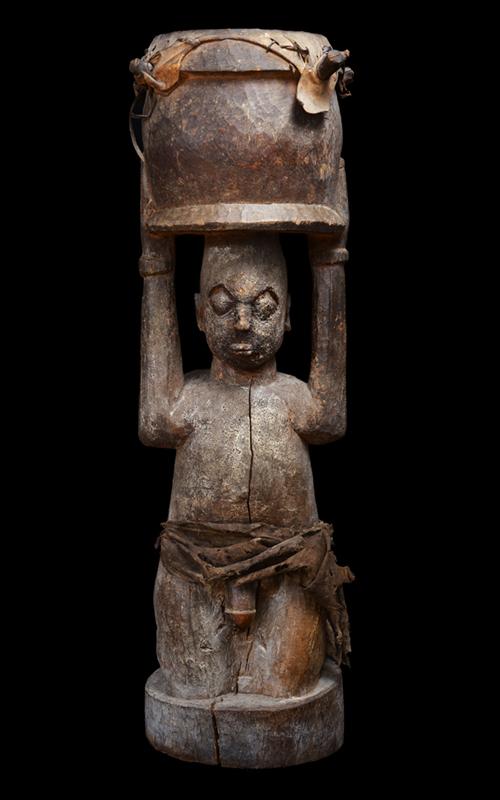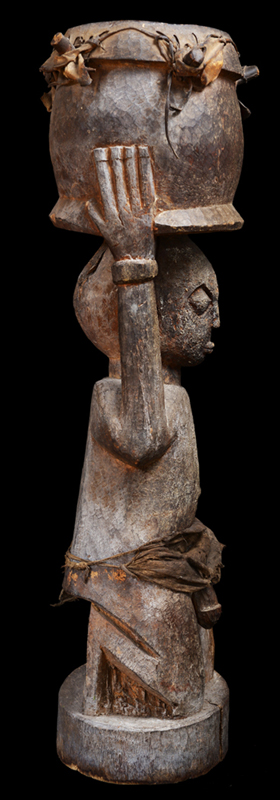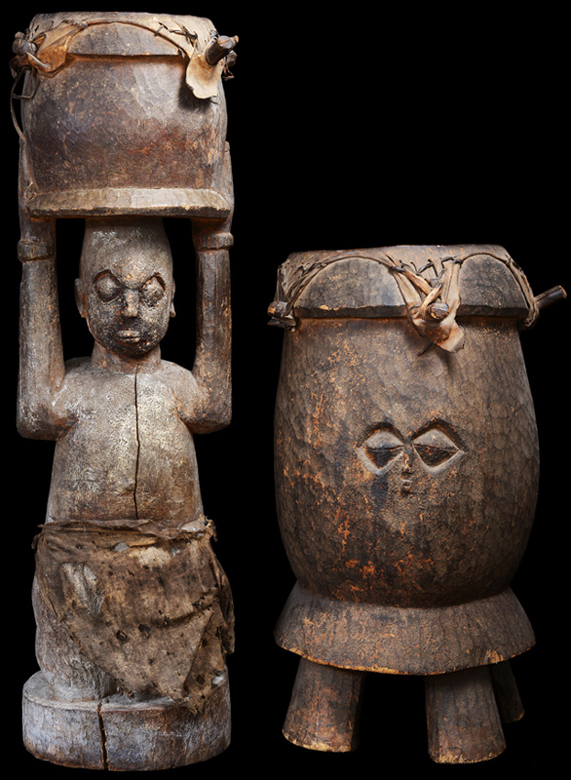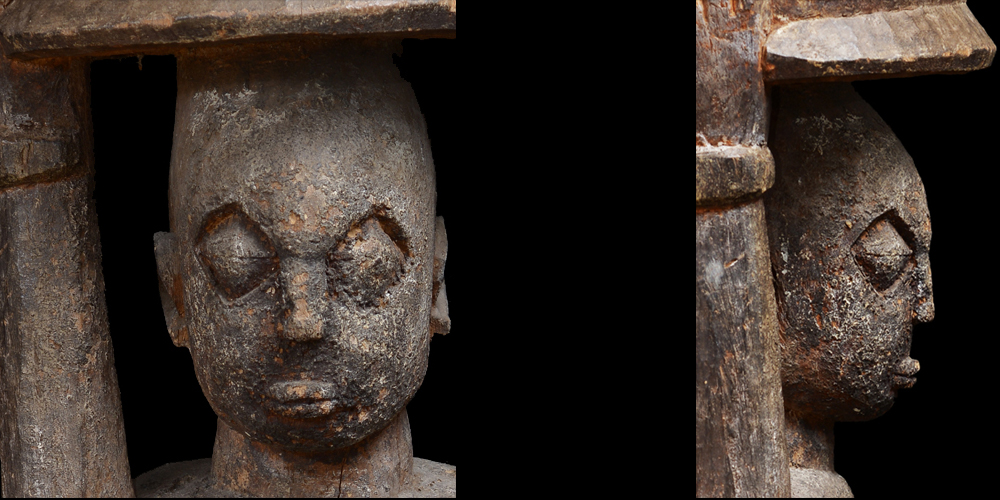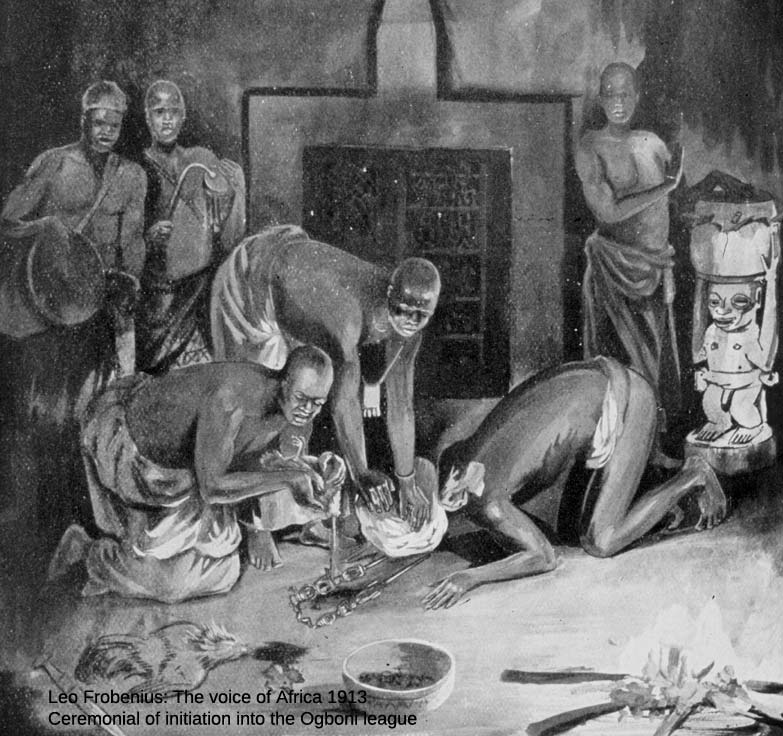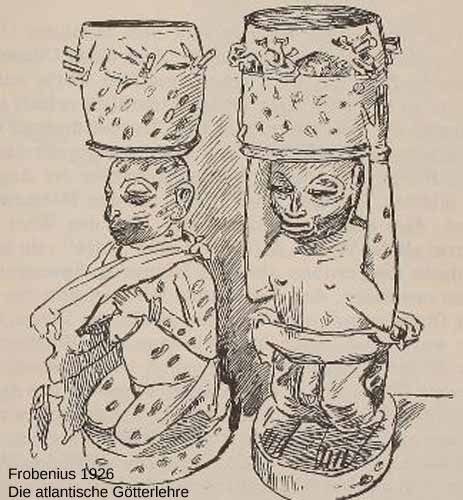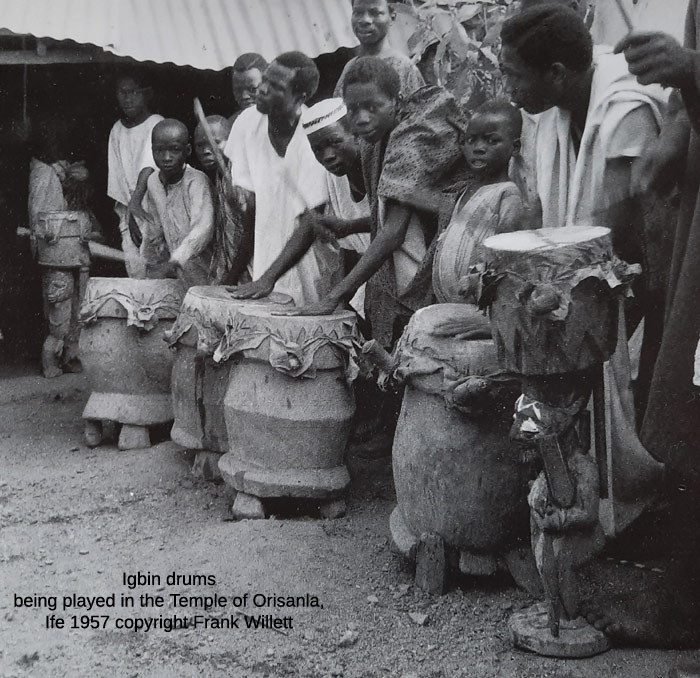DRUMS OF THE WORLD
Africa
Igbin drum Nigeria
Igbin drum Yoruba / Trommel Nigeria
"The Ìgbìn drum was used throughout Yorubaland and the socio-religious role of the drum is infused in many segments of Yoruba ritual, civic, and spiritual practice. Without the music of the Ìgbìn drums most funerals, festivals, and incantations at ceremonies would have been incomplete or impossible.(...)
The relationship between people and drums in Yorùbá society is innovative. This relationship provides access to spiritual, ontological, and cultural information that is visible and invisible. The drum allows this information to be accessed through sound, symbols, basic design, and characteristic rhythms. All drums in the Ìgbìn drum family represent historically, the bridge between domains both sacred and secular."
excerpt from: Tamara De Silva, Symbols and Ritual: The socio-religous role of the igbin drum family.
"Obatala, one of the original orisa who descended from heaven at the creation of the world, was fond of dancing and used to do so to the hand-clapping of his four wives. Eventually he had four drums made from omon wood, naming them after his four wives( Laoye I 1966: 35). These drums, the igbin set, are used in the cult of Obatala and are single membrane drums with peg bracing, played with a single straight stick held in the right hand whilst the left hand is used to regulate the tone. The body of the igbin drum may be cylindrical with or without feet, biconical, barrel-shaped or in human form."
excert from: Willet, Frank : A Contribution to the History of Musical Instruments among the Yoruba. 1977
"Die heilige Trommel Oschallas heißt Egwi. Ich sah eine ganze Reihe von Exemplaren, die in mancherlei Form geschnitzt waren und in Bangba, einem Orte nahe Ife standen. Sie gehörten paarweise zusammen, und jedes Exemplar, das ausdrucksvoll als männliches geschnitzt war, stand stets neben einer Trommel, die eine Frauenfigur repräsentierte. Allem Anschein nach wurden sie außerordentlich hoch verehrt."
Excerpt from: Leo Frobenius - Die Atlantische Götterlehre 1926
Bibliography:
Frobenius, Leo : Die Atlantische Götterlehre 1926
De Silva,Tamara : Symbols and Ritual - The socio-religous role of the igbin drum family.
Beier, Ulli : Three Igbin drums from Igbomina. 1963
Beier, Ulli : Obatala Festival. - In: Nigeria Bd.52 1956
Dagan , Esther A. : Drums - The Heartbeat of Africa edited by Galerie Amrad 1993
King, Anthony : Yoruba Sacred Music from Ekiti. Ibadan 1961
Kubik, Gerhard : Musikgeschichte in Bildern - Westafrika. Leipzig 1989
Laoye I. Timi von Ede : Yoruba Drums. 1959
Meyer, Andreas : Afrikanische Trommeln – West- und Zentralafrika. Staatliche Museen Preußischer Kulturbesitz, Berlin 1997
Meyer, Andreas : African Drums in the Berliner Museum für Völkerkunde. In: Dagen, Esther A.(Hrsg.): Drums. The Heartbeat of Africa. Galerie Amrad 1993
Ortiz, Fernando: Los instrumentos de la musica afrocubana. Habana 1952 V. Volumes.
Thieme, Darius : A Descriptive Catalogue of Yoruba Musical Instruments. Diss. Washington D.C. 1969
Wieschhoff, Heinz : Die afrikanischen Trommeln und ihre außerafrikanischen Beziehungen. Stuttgart 1933
Willet, Frank : A Contribution to the History of Musical Instruments among the Yoruba. 1977
"The Ìgbìn drum was used throughout Yorubaland and the socio-religious role of the drum is infused in many segments of Yoruba ritual, civic, and spiritual practice. Without the music of the Ìgbìn drums most funerals, festivals, and incantations at ceremonies would have been incomplete or impossible.(...)
The relationship between people and drums in Yorùbá society is innovative. This relationship provides access to spiritual, ontological, and cultural information that is visible and invisible. The drum allows this information to be accessed through sound, symbols, basic design, and characteristic rhythms. All drums in the Ìgbìn drum family represent historically, the bridge between domains both sacred and secular."
excerpt from: Tamara De Silva, Symbols and Ritual: The socio-religous role of the igbin drum family.
"Obatala, one of the original orisa who descended from heaven at the creation of the world, was fond of dancing and used to do so to the hand-clapping of his four wives. Eventually he had four drums made from omon wood, naming them after his four wives( Laoye I 1966: 35). These drums, the igbin set, are used in the cult of Obatala and are single membrane drums with peg bracing, played with a single straight stick held in the right hand whilst the left hand is used to regulate the tone. The body of the igbin drum may be cylindrical with or without feet, biconical, barrel-shaped or in human form."
excert from: Willet, Frank : A Contribution to the History of Musical Instruments among the Yoruba. 1977
"Die heilige Trommel Oschallas heißt Egwi. Ich sah eine ganze Reihe von Exemplaren, die in mancherlei Form geschnitzt waren und in Bangba, einem Orte nahe Ife standen. Sie gehörten paarweise zusammen, und jedes Exemplar, das ausdrucksvoll als männliches geschnitzt war, stand stets neben einer Trommel, die eine Frauenfigur repräsentierte. Allem Anschein nach wurden sie außerordentlich hoch verehrt."
Excerpt from: Leo Frobenius - Die Atlantische Götterlehre 1926
Bibliography:
Frobenius, Leo : Die Atlantische Götterlehre 1926
De Silva,Tamara : Symbols and Ritual - The socio-religous role of the igbin drum family.
Beier, Ulli : Three Igbin drums from Igbomina. 1963
Beier, Ulli : Obatala Festival. - In: Nigeria Bd.52 1956
Dagan , Esther A. : Drums - The Heartbeat of Africa edited by Galerie Amrad 1993
King, Anthony : Yoruba Sacred Music from Ekiti. Ibadan 1961
Kubik, Gerhard : Musikgeschichte in Bildern - Westafrika. Leipzig 1989
Laoye I. Timi von Ede : Yoruba Drums. 1959
Meyer, Andreas : Afrikanische Trommeln – West- und Zentralafrika. Staatliche Museen Preußischer Kulturbesitz, Berlin 1997
Meyer, Andreas : African Drums in the Berliner Museum für Völkerkunde. In: Dagen, Esther A.(Hrsg.): Drums. The Heartbeat of Africa. Galerie Amrad 1993
Ortiz, Fernando: Los instrumentos de la musica afrocubana. Habana 1952 V. Volumes.
Thieme, Darius : A Descriptive Catalogue of Yoruba Musical Instruments. Diss. Washington D.C. 1969
Wieschhoff, Heinz : Die afrikanischen Trommeln und ihre außerafrikanischen Beziehungen. Stuttgart 1933
Willet, Frank : A Contribution to the History of Musical Instruments among the Yoruba. 1977
